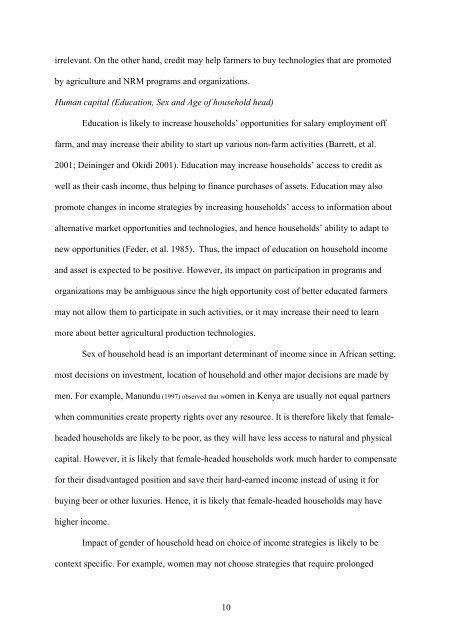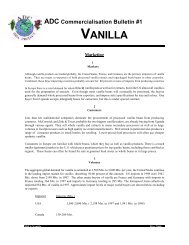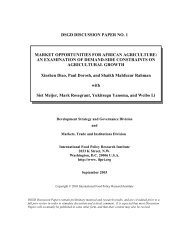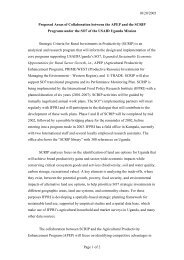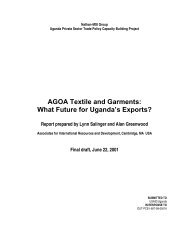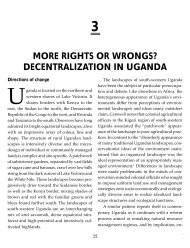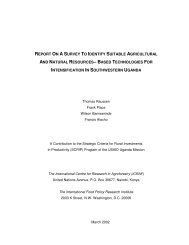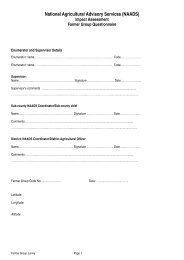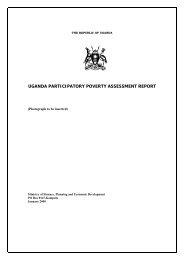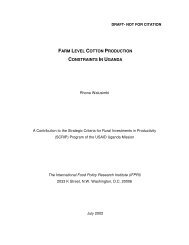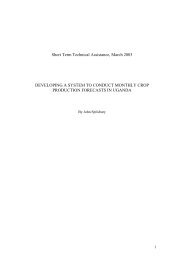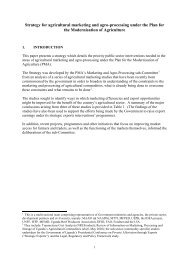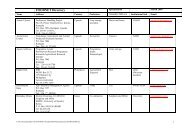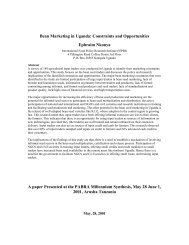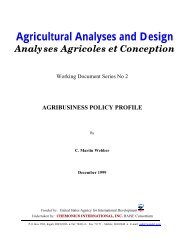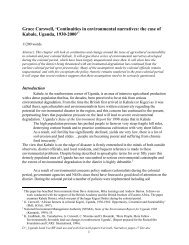community and household-level income & asset status baseline
community and household-level income & asset status baseline
community and household-level income & asset status baseline
You also want an ePaper? Increase the reach of your titles
YUMPU automatically turns print PDFs into web optimized ePapers that Google loves.
irrelevant. On the other h<strong>and</strong>, credit may help farmers to buy technologies that are promoted<br />
by agriculture <strong>and</strong> NRM programs <strong>and</strong> organizations.<br />
Human capital (Education, Sex <strong>and</strong> Age of <strong>household</strong> head)<br />
Education is likely to increase <strong>household</strong>s’ opportunities for salary employment off<br />
farm, <strong>and</strong> may increase their ability to start up various non-farm activities (Barrett, et al.<br />
2001; Deininger <strong>and</strong> Okidi 2001). Education may increase <strong>household</strong>s’ access to credit as<br />
well as their cash <strong>income</strong>, thus helping to finance purchases of <strong>asset</strong>s. Education may also<br />
promote changes in <strong>income</strong> strategies by increasing <strong>household</strong>s’ access to information about<br />
alternative market opportunities <strong>and</strong> technologies, <strong>and</strong> hence <strong>household</strong>s’ ability to adapt to<br />
new opportunities (Feder, et al. 1985). Thus, the impact of education on <strong>household</strong> <strong>income</strong><br />
<strong>and</strong> <strong>asset</strong> is expected to be positive. However, its impact on participation in programs <strong>and</strong><br />
organizations may be ambiguous since the high opportunity cost of better educated farmers<br />
may not allow them to participate in such activities, or it may increase their need to learn<br />
more about better agricultural production technologies.<br />
Sex of <strong>household</strong> head is an important determinant of <strong>income</strong> since in African setting,<br />
most decisions on investment, location of <strong>household</strong> <strong>and</strong> other major decisions are made by<br />
men. For example, Manundu (1997) observed that women in Kenya are usually not equal partners<br />
when communities create property rights over any resource. It is therefore likely that female-<br />
headed <strong>household</strong>s are likely to be poor, as they will have less access to natural <strong>and</strong> physical<br />
capital. However, it is likely that female-headed <strong>household</strong>s work much harder to compensate<br />
for their disadvantaged position <strong>and</strong> save their hard-earned <strong>income</strong> instead of using it for<br />
buying beer or other luxuries. Hence, it is likely that female-headed <strong>household</strong>s may have<br />
higher <strong>income</strong>.<br />
Impact of gender of <strong>household</strong> head on choice of <strong>income</strong> strategies is likely to be<br />
context specific. For example, women may not choose strategies that require prolonged<br />
10


